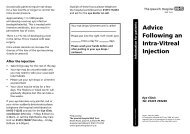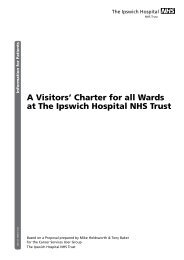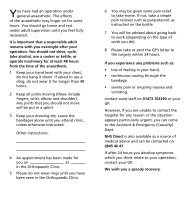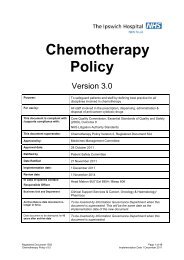Minor Anorectal Surgery - Ipswich Hospital
Minor Anorectal Surgery - Ipswich Hospital
Minor Anorectal Surgery - Ipswich Hospital
You also want an ePaper? Increase the reach of your titles
YUMPU automatically turns print PDFs into web optimized ePapers that Google loves.
Information for patients<strong>Minor</strong> <strong>Anorectal</strong><strong>Surgery</strong>General <strong>Surgery</strong> (via <strong>Hospital</strong> Switchboard)Tel: 01473 712233DMI ref: 11583-09.indd(RP)Issue 2: July 2010© The <strong>Ipswich</strong> <strong>Hospital</strong> NHS Trust, 2009-2010. All rights reserved. Not to bereproduced in whole, or in part, without the permission of the copyright owner.
<strong>Minor</strong> ano-rectal surgery covers surgery for skin tags, fibro-epithelialpolyps, external haemorrhoids and warts. These are all benign lumpswhich may occur around the outside of the anus (back passage). Theymay occasionally itch, bleed or interfere with anal hygiene. Warts canoccur anywhere on the body, including the genital and perianal areas.Warts may be treated with medicines applied directly to the affectedarea, but may also be surgically removed.Your surgeon has recommended that you undergo minor surgery ofthe anal skin, anal canal or rectum. This surgery should remove theproblem which is causing your symptoms. There are no non-surgicalalternatives to this recommended treatment.<strong>Minor</strong> ano-rectal surgery is generally very safe with few risks but, aswith any surgical procedure, complications can occasionally occur. Therisks can be due to surgery in general, anal surgery or the anaesthetic.Before your operationAlthough most of these conditions are relatively minor, they occur in asensitive area of the body, and so some form of anaesthetic is requiredin order to remove them surgically.Most of these operations are carried out as day surgery butoccasionally other medical factors or social circumstances make anovernight hospital stay necessary. If you are to be admitted then youwill be asked to attend a pre-admission clinic, when you will meet oneof the junior doctors or nurse specialists.At this clinic, we record details of your medical history and carry outany necessary clinical examinations and investigations such as a swabfor MRSA infection. This is an opportunity for you to ask questionsabout your admission.You will be asked if you are taking any tablets or other types ofmedication – these might be ones prescribed by a doctor or boughtover the counter in a pharmacy. It helps us if you bring details, or thepackaging, with you of anything you are taking.Prior to your admission you should be on a high fibre diet and a fluidintake of at least 6 – 10 glasses of water daily to keep your bowelmotion soft. Just before surgery the nurse may give you an enema toempty your bowel.Page 2
Prevention of surgical site infectionIt may be necessary during the procedure to shave another area ofyour body, such as your thigh, to allow attachment of a pad for thediathermy machine (used to seal blood vessels), so that the pad sticksto your skin to achieve the best and safest performance.Hair removal from the site of the operation up to 60 minutes beforesurgery reduces the risk of infection. This means that the hair removalprocedure is usually carried out on the operating table.You must not shave the area yourself; this will be carried out in theoperating theatre. Shaving at home, or the night before surgery,increases the risk of infection as, no matter how careful you are, theskin may become irritated and this could increase the risk of infection.During the operationThe surgery depends on your particular problem. If tissue is removed,there will either be one or more small open wounds or the skin willbe closed with absorbable stitches. Apart from protective gauze, nospecial dressings are normally required. Healing in this area is notaffected by bowel actions.After your operationIf you have a general anaesthetic you will wake up in the recovery roomafter your operation. You might have an oxygen mask on your face tohelp you breathe and you may also feel sleepy. While you are in therecovery room a nurse will check your pulse and blood pressure regularly.When you are well enough, you will be taken back to the ward.Some people feel sick after an operation, especially if they have hada general anaesthetic. If you do feel sick, please tell a nurse who willgive you some medication to make you more comfortable.One to two hours after your operation you will be encouraged toget up and walk a little. You will be able to go home the same dayif you are having day surgery or the following day if you are to stayovernight.You should open your bowels 1 – 3 days after the operation. This maybe uncomfortable at first and a small amount of bleeding is possible.Page 3
You may be given a laxative to take for two weeks after the operationto prevent constipation.During surgery, a local anaesthetic is given which will provide painrelief for the rest of the day. After surgery you will be given additionalpain relief medication.Once you return home you may have 15-minute baths, in water aswarm as you can tolerate with a handful of table salt, as often asnecessary to control pain. These baths are very soothing and provideseveral hours of pain relief.After your operation you may eat and drink normally but werecommend you continue to follow a high fibre diet and drink 6 – 10glasses of water a day.After a few days, if you feel comfortable, you should be able toresume your usual activities, including lifting, driving and work.Follow-upBefore you leave hospital, you will be given details if you need toreturn to see us, for example for an outpatient clinic appointment orfor the results of your surgery. Your surgeon usually writes to you oryour GP with the histology (laboratory analysis) of any tissue removedduring your surgery.When to contact your GPIn the period following your operation you should contact your GP ifyou experience any of the following problems:• increasing pain, redness, swelling or discharge;• severe bleeding;• constipation for more than three days, despite using a laxative;• difficulty in passing urine;• temperature higher than 38˚C or chills; or• nausea or vomiting.Produced by:The <strong>Ipswich</strong> <strong>Hospital</strong> NHS TrustHeath Road, <strong>Ipswich</strong>, Suffolk IP4 5PD<strong>Hospital</strong> switchboard: 01473 712233www.ipswichhospital.nhs.uk
















